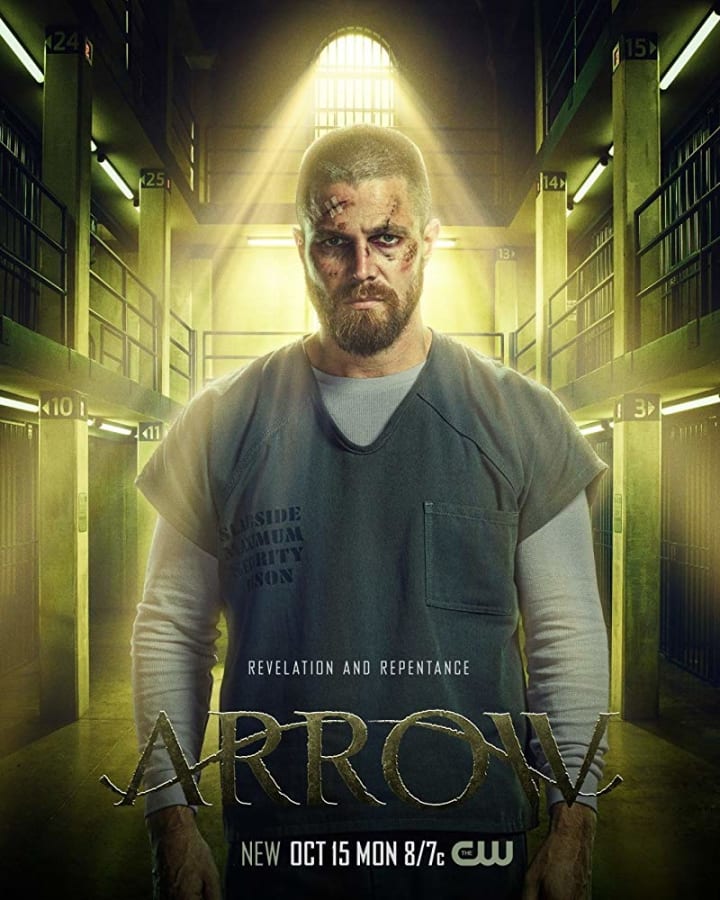
The first season of Arrow was grounded and dark, unlike any superhero show that had come before it. Oliver Queen and his alter ego (he was the Hood back then) spent five years on a seemingly deserted island before finding a way home. The Hood (or the Green Arrow, as he would come to be known) spent his nights using a list his father had provided him with to rid the streets of crime. And by rid, I mean brutally murder with as many arrows as he could possibly fit in them. And it was great television. The villain was grounded, he was a man who had trained in archery and had loose ties to Ra's al Ghul. The first series was also not afraid to sacrifice characters, with Oliver's best friend Tommy dying in the finale. All of them made for a gritty, violent and most of all entertaining take on the superhero genre.
Then came the second season, and largely matched the quality of the first season. The villain was stronger, having been introduced in season one, and the flashbacks tied together well. We also got our first look at the extended Arrowverse, in the form of Barry Allen's two episode stay in Starling City. Whilst the quality did not initially dip, the third season of Arrow highlighted the problems the Arrowverse was beginning to cause.
Yes, the Mirakuru introduced in season two was less grounded than anything in the first season, but it still made sense for the show. What did not make sense for a grounded superhero show, was the introduction of magic. Ra's Al Ghul as a season three villain furthered the show from its dark and gritty origins, but Arrow was no longer allowed to be a dark and gritty show. Because with the introduction of The Flash, Arrow now shared a universe with talking gorillas and huge shark-men. And let's be honest, I don't think there's anything less dark and gritty than talking gorillas and huge shark-men.
But Ra's Al Ghul was not enough, Arrow's third season actually killed off The Green Arrow himself... for two episodes. After which he was brought back to life thanks to a vague and illogical plot device. It wasn't even the Lazarus pit which brought Oliver back, although that is the entire purpose of the Lazarus pit. The season three finale was built around introducing the CW's newest show, the (terrible) Legends of Tomorrow.

By season four, people were losing faith in Arrow, and I was too. Damien Darhk was a carbon copy of Ra's Al Ghul, except he was blonde. The season was largely underwhelming and it was becoming desperate. The "who's in the grave" tease was a weak attempt at getting people interested in the show again, and then the reveal that the grave belonged to Laurel was largely unsatisfying.
Season five of the show actually got the show back on track. It was the first time that Arrow was allowed to be Arrow again. The story was grounded and effective, and the villain was the best since Slade Wilson. I was hooked once again. And then, we were left with possibly the best finale the show has ever had and I could not wait to see who had died in the explosions when season six came around.
I stopped watching Arrow after the first episode of season six, when it was revealed that not one important character died in the explosions. This for me was the final nail, and it wasn't a rash decision. The wider Arrowverse as a whole seemed to destroy everything the show had going for it. The multi-verse allowed the show to kill off characters and then replace them with new versions of the same character. The relationship between Oliver and Felicity has always felt like fan service, and I'm convinced Felicity should have died in season three. And the growth of Team Arrow, which started with three people and has now grown to the extent that it seems literally everybody knows who the Green Arrow is (I know his identity was revealed at the end of season six).
In fairness to the Arrowverse, the crossover events are very well done and hugely entertaining, but they just don't justify the decrease in one show's quality. I have watched a number of episodes of season seven, particularly the ones in which Oliver is in jail. Although they are definitely a return to form, I have no real desire to go back and watch any more of the show. For that reason, I think the decision for the show to end with season eight is a sensible one. It's a disappointment that Arrow could not maintain its high levels of quality, but maybe this is the proof that not everything needs to be part of shared universe.
About the Creator
Tv Things
All things TV.
Film account: Film Things






Comments
There are no comments for this story
Be the first to respond and start the conversation.